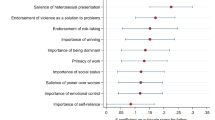Abstract
In polygynous societies in which the family consists of husband, wives, and children only, if each cowife lives in a separate quarter with her children, males are more likely to be circumcised or segregated at puberty. These customs are interpreted as the measures to rectify boys' mother-oriented personality development because of limited contact with their fathers due to their mother's separate quarters. Circumcision and segregation can be explained better in terms of the son's insufficient contact with the father rather than a very close relationship with the mother due to the long postpartum sexual taboo.
Similar content being viewed by others
References
Biller, H. B. (1970). Father absence and the personality development of the male child.Develop. Psychol. 2: 181–201.
Biller, H. B., and Borstelmann, L. J. (1967). Masculine development: An integrative review.Merrill-Palmer Quart. Behav. Develop. 13: 253–294.
Burton, R. V., and Whiting, J. W. M. (1961). The absent father and cross-sex identity.Merrill-Palmer Quart. Behav. Develop. 7(2): 85–95.
Festinger, L., Schachter, S., and Back, K. (1950).Social Pressures in Informal Groups Harper, New York.
Homans, G. C. (1950).The Human Group Harcourt, Brace, New York.
Murdock, G. P. (1967).Ethnographic Atlas University of Pittsburgh Press, Pittsburgh.
Stephens, W. N. (1962).The Oedipus Complex Free Press, New York.
Whiting, J. W. M. (1964). Effects of climate on certain cultural practices. In Goodenough, W. H. (ed.),Explorations in Cultural Anthropology McGraw-Hill, New York, pp. 511–544.
Whiting, J. W. M., and Kluckhohn, R. (n.d.). Ratings of duration of the post-partum sexual taboo. Unpublished paper, Laboratory of Human Development, Harvard University, Cambridge, Mass.
Whiting, J. W. M., Kluckhohn, R., and Anthony, A. (1958). The function of male initiation ceremonies at puberty. In Maccoby, E. E., Newcomb, T. M., and Hartley, E. L. (eds.),Readings on Social Psychology 3rd ed., Holt, Rinehart and Winston, New York, pp. 359–370.
Zajonc, R. B. (1968). The attitudinal effects of mere exposure.J. Personal. Social Psychol. Monogr. Suppl. 9(2): 1–27.
Author information
Authors and Affiliations
Rights and permissions
About this article
Cite this article
Kitahara, M. Polygyny: Insufficient father-son contact and son's masculine identity. Arch Sex Behav 5, 201–209 (1976). https://doi.org/10.1007/BF01541371
Issue Date:
DOI: https://doi.org/10.1007/BF01541371




